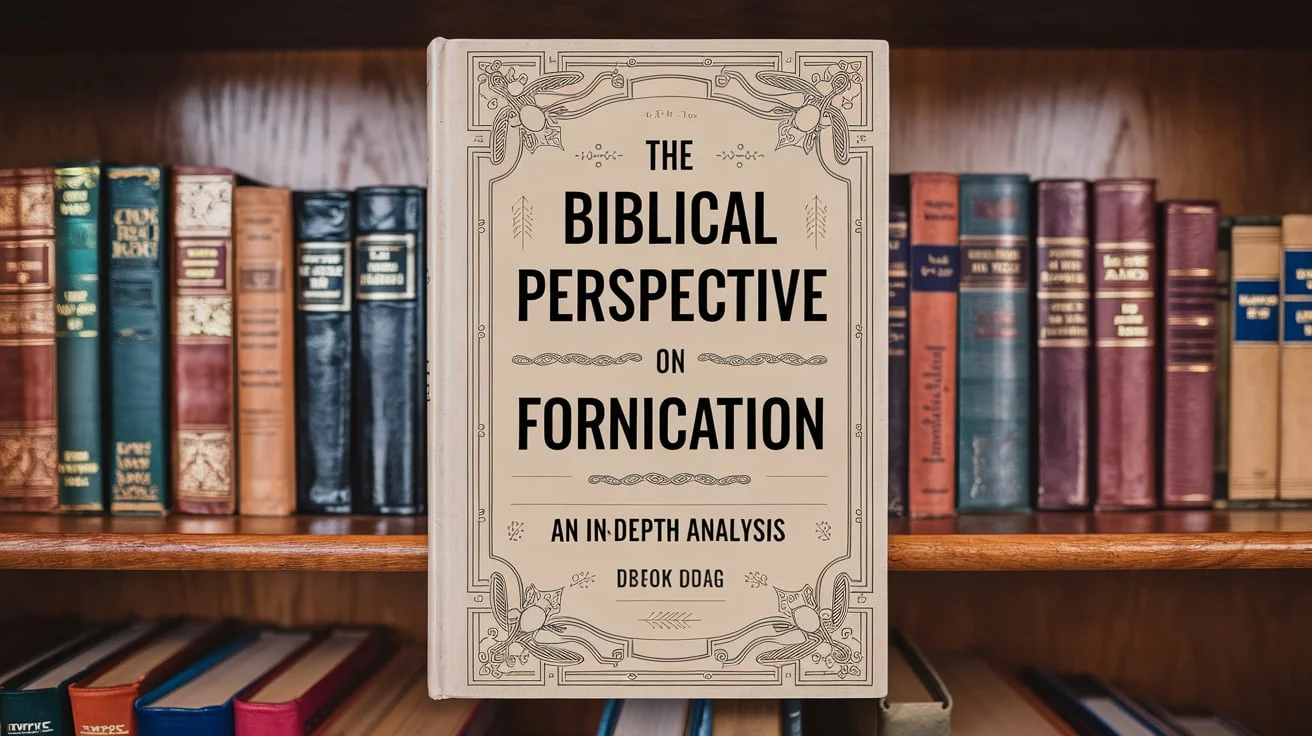Last Updated on November 7, 2024 by Ethan Richards
Understanding the Biblical perspective on fornication requires a thorough examination of various scriptures and interpretations.
“💔 Discover the Biblical perspective on sexual relationships, distinguishing between fornication and marriage. Explore key scriptures and teachings on this vital topic and understand why the Bible places such significance on the sanctity of marriage. This guide provides a faith-based foundation to inform and enrich your view on relationships.”
This comprehensive guide explores what the Bible says about fornication, how it has been interpreted over time, and its implications for modern relationships.
Defining Fornication

Fornication is often misunderstood. In Biblical terms, it refers to sexual activity outside the bounds of marriage. The term comes from the Greek word “porneia,” which encompasses various forms of sexual immorality. To fully grasp its Biblical meaning, let’s break it down:
- Biblical Definition: In the Bible, fornication generally means engaging in sexual relations outside the covenant of marriage. It is a broader term that includes adultery and other forms of sexual sin.
- Common Misconceptions: Many people confuse fornication with other sins. For example, adultery specifically refers to marital infidelity, while fornication encompasses all illicit sexual activity.
Different Interpretations of Fornication
Biblical interpretations of fornication vary significantly across denominations and historical contexts:
- Historical Context: Early interpretations were heavily influenced by Jewish laws and Roman cultural norms. These interpretations have evolved as Christianity spread across different cultures.
- Scholarly Perspectives: Modern scholars offer diverse views on fornication. Some emphasize a literal interpretation of scriptural texts, while others consider historical and cultural contexts to inform their understanding.
Fornication and Marriage
Marriage holds a central place in Biblical teachings:
- Biblical View on Marriage: The Bible defines marriage as a sacred covenant between a man and a woman. It is intended to be a lifelong commitment characterized by mutual respect and fidelity.
- Fornication vs. Adultery: While fornication refers to sexual immorality outside of marriage, adultery specifically involves sexual relations with someone who is married. Both are condemned in Biblical teachings but are distinct in their contexts and implications.
Biblical Guidelines on Sexual Morality
The Bible provides clear guidelines on sexual morality, offering both prohibitions and positive instructions:
- Old Testament Teachings: The Old Testament contains numerous laws about sexual conduct. Key examples include:
- Leviticus 18: Lists various prohibited sexual relationships.
- Deuteronomy 22:20-21: Prescribes penalties for sexual misconduct before marriage.
- New Testament Teachings: The New Testament builds on these principles with a focus on internal purity and relational integrity:
- 1 Corinthians 6:18: Advises believers to flee from sexual immorality.
- Hebrews 13:4: Upholds the honor of marriage and condemns sexual immorality.
Old Testament Perspectives on Fornication

In the Old Testament, fornication was often viewed through the lens of ceremonial and moral laws:
- Specific Laws and Regulations: The Old Testament outlines various sexual laws. For example:
- Exodus 22:16-17: Addresses the consequences of seducing an unmarried woman.
- Deuteronomy 22:13-21: Deals with accusations of sexual misconduct.
- Cultural and Historical Context: These laws were shaped by the cultural practices and societal norms of ancient Israel.
Understanding this context helps clarify their application and significance.
New Testament Perspectives on Fornication

The New Testament continues the discussion on fornication with a focus on spiritual and moral purity:
- Teachings of Jesus: Jesus’ teachings on fornication emphasize purity of heart and mind:
- Matthew 5:27-28: Jesus expands the concept of adultery to include lustful thoughts, highlighting the importance of internal purity.
- Apostolic Letters and Epistles: The apostles provided practical guidance for early Christians:
- 1 Thessalonians 4:3-5: Paul urges believers to live in holiness and avoid sexual immorality.
- Ephesians 5:3: Paul instructs the Ephesian church to avoid even a hint of sexual immorality.
Fornication and Gender Disparity in Biblical Teachings
Gender roles and expectations in Biblical teachings on fornication often reflect historical biases:
- Gender Roles and Expectations: The Bible’s teachings on fornication were influenced by the gender norms of ancient societies. For instance:
- Deuteronomy 22:13-21: Shows how sexual misconduct was addressed differently for men and women.
- Differences in Application: While the principles of sexual morality are consistent, their application has historically varied by gender. Modern interpretations strive for a more egalitarian approach.
Understanding the Whole Picture
To grasp the Biblical perspective on fornication, consider the broader themes of purity, covenant, and relationship with God:
- Thematic Connections: Fornication is not just a violation of moral laws but a breach of the covenant relationship between individuals and God.
- Consistency Across Scriptures: Despite different contexts and emphases, the Biblical message about sexual morality remains consistent.
Seeking Clarity on Fornication in Modern Contexts
Modern cultural shifts pose challenges to applying Biblical teachings:
- Contemporary Challenges: Issues such as changing social norms and diverse cultural attitudes impact how fornication is perceived today.
- Applying Biblical Teachings Today: Navigating these challenges involves balancing Biblical principles with contemporary understandings of relationships and sexuality.
Applying Biblical Principles to Relationships and Sexual Choices
Implementing Biblical teachings in modern relationships requires thoughtful application:
- Practical Advice: Here are some steps to align your relationships with Biblical principles:
- Commit to Purity: Maintain sexual purity by setting boundaries and fostering mutual respect.
- Seek Guidance: Consult spiritual mentors or counselors for support in aligning your values with Biblical teachings.
- Examples and Anecdotes: Stories from individuals who have navigated relationships in light of Biblical principles can provide practical insights and encouragement.
FAQs
1. What Does the Bible Say About Fornication?
The Bible often discusses fornication as a sin, particularly in verses that emphasize moral purity and the sanctity of marriage.
In passages like 1 Corinthians 6:18-20, fornication is described as a misuse of the body, which is considered a temple of the Holy Spirit.
2. Why Is Marriage Considered Sacred in the Bible?
Marriage in the Bible symbolizes a sacred union and commitment, aligning with God’s design for relationships.
Scriptures like Genesis 2:24 and Ephesians 5:31 underscore that marriage represents a covenant, mirroring the bond between Christ and the Church.
3. How Does the Bible Define Sexual Purity?
The Bible calls for sexual purity, which encompasses abstaining from sexual relationships outside of marriage.
Verses like 1 Thessalonians 4:3-5 urge believers to avoid sexual immorality, including fornication, as part of honoring God.
4. Is Fornication Treated Differently from Other Sins in the Bible?
Yes, fornication is often highlighted as a sin that impacts both the spirit and the body.
While all sins can be forgiven, 1 Corinthians 6:18 points out that sexual sins are unique because they affect a person’s own body in addition to their spiritual well-being.
5. Why Is Marriage the Only Approved Setting for Sexual Intimacy According to Scripture?
According to the Bible, marriage is designed to be the only setting where sexual intimacy aligns with God’s plan.
Hebrews 13:4 states, “Marriage should be honored by all, and the marriage bed kept pure,” indicating that fornication contradicts this divine purpose.
Conclusion
The Biblical perspective on fornication offers valuable insights into sexual morality and relationships. By understanding the historical, cultural, and theological contexts, you can apply these principles to your life today.

Justin Taylor is a gifted storyteller and dream analyst who brings a fresh perspective to biblical dream interpretations. His engaging narratives and intuitive insights captivate readers, guiding them through the intricate tapestry of their subconscious mind.










